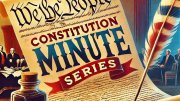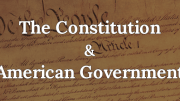Introduction: IRS Power and Public Trust
In the previous post of our “Reclaiming Power” series, we examined the FBI’s role in undermining due process and eroding public trust. As we continue our exploration of government agencies, we now turn our attention to the Internal Revenue Service (IRS). While the IRS is responsible for collecting taxes and enforcing tax laws, it has also been at the center of allegations regarding political bias and the weaponization of its power. In this article, we’ll discuss how accusations of IRS weaponization raise Constitutional concerns about equal protection under the law.
The Role of the IRS in the Constitutional Framework
The IRS serves a critical function in the U.S. government, ensuring that individuals and organizations comply with tax laws and contribute their fair share. However, the Constitution’s protections, particularly under the Fourteenth Amendment’s Equal Protection Clause, prevent government agencies like the IRS from unfairly targeting specific individuals or groups based on political affiliations or beliefs.
The Founding Fathers built protections into the Constitution to prevent government overreach, and tax collection was no exception. While the IRS plays an essential role in keeping the government funded, its actions must be held to the same Constitutional standards that apply to other branches of government. Unfortunately, when the IRS is accused of targeting specific groups, it threatens the principles of fairness and impartiality at the core of the American legal system.
IRS Weaponization: Targeting Political Groups
One of the most high-profile examples of IRS weaponization occurred during the 2013 IRS targeting scandal. In this scandal, conservative organizations, particularly those with “Tea Party” in their names, were subjected to additional scrutiny when applying for tax-exempt status. A 2017 Treasury Department investigation confirmed that this scrutiny was not applied equally to other political groups, which fueled accusations that the IRS had been used to hinder conservative activism.
The impact of this scandal was profound, casting doubt on the IRS’s ability to operate impartially. When a government agency selectively enforces laws or disproportionately targets certain groups, it violates the core principle of equal protection under the law. Many conservative organizations faced significant delays, additional questioning, and an overall increase in administrative burdens, which prevented them from operating freely during a critical time for political activism.
Even though the IRS later apologized and attempted to rectify the situation, the damage to public trust was done. It highlighted how easily a government agency could be used as a tool for political ends, undermining the system’s fundamental fairness.
Constitutional Focus: Equal Protection Under the Law
The Fourteenth Amendment guarantees that no individual or group should be denied equal protection under the law. This principle ensures that the government cannot discriminate against anyone based on their beliefs, affiliations, or other characteristics. When the IRS is accused of targeting specific political groups, it raises serious concerns about violating this Constitutional right.
The IRS’s mission is to apply tax laws uniformly and without bias. However, when its actions show favoritism or selective enforcement, they threaten the rule of law. Equal protection under the law is not just a concept reserved for criminal cases—it applies to every aspect of government, including tax enforcement.
In the IRS targeting scandal, conservative groups were subjected to a disproportionate level of scrutiny, raising questions about whether the IRS had violated the Equal Protection Clause by treating certain political groups differently. This undermined the fairness and integrity of the tax system, which should be applied equally to all citizens, regardless of their political affiliations.
The Impact of IRS Weaponization on Public Trust
When an agency as powerful as the IRS is perceived as biased or weaponized, the consequences extend far beyond those directly impacted. Public trust in the agency erodes, and the perception of unfair treatment diminishes confidence in the entire tax system. Tax laws, which are already complex and often contentious, become even more difficult to enforce when citizens believe they are being used as political tools.
Moreover, IRS weaponization sets a dangerous precedent for future abuses of power. If the IRS can target specific groups without consequence, other government agencies could follow suit, using their authority to suppress political opposition or favor certain ideologies. This erodes the foundations of democracy, where every citizen and group should be treated fairly under the law.
Reclaiming Power: Restoring Integrity in Tax Enforcement
To reclaim power and restore public trust in the IRS, several reforms are needed:
-
Increased Oversight and Accountability: Ensuring that the IRS is subject to independent oversight can help prevent future instances of political bias or weaponization. Transparency is critical in maintaining public trust.
-
Strict Adherence to Constitutional Principles: The IRS must uphold the Fourteenth Amendment’s equal protection guarantees by applying tax laws consistently, without regard to political beliefs or affiliations.
-
Clearer Guidelines for Tax-Exempt Applications: Establishing non-partisan, transparent criteria for determining tax-exempt status can help prevent perceptions of bias in the approval process. All groups should be treated equally, regardless of their political leanings.
-
Restoration of Public Confidence: The IRS must actively work to restore the public’s confidence by being transparent about its processes, addressing past wrongs, and ensuring fair treatment for all taxpayers moving forward.
Conclusion: Safeguarding Fairness in Government
The IRS plays a critical role in maintaining the financial stability of the government, but it must do so in a manner that is fair, impartial, and free from political influence. Allegations of IRS weaponization against specific political groups, such as the 2013 targeting scandal, demonstrate how easily government power can be abused if left unchecked.
As we continue to explore the role of government agencies in our “Reclaiming Power” series, it is clear that safeguarding the Constitutional principle of equal protection under the law is critical to preserving a fair and just society. In our next article, we will investigate the Environmental Protection Agency (EPA) and how its actions have raised concerns about property rights and regulatory overreach. Join us as we continue to discuss the need to reclaim power and protect individual liberties from government overreach.
Read the Reclaiming Power Series:
- Reclaiming Power: DOJ Weaponization and the Rule of Law
- Reclaiming Power: FBI Weaponization and Due Process
- Reclaiming Power: IRS Weaponization and Equal Protection
- Reclaiming Power: EPA Weaponization and Property Rights
- Reclaiming Power: DHS Weaponization and Individual Liberties



